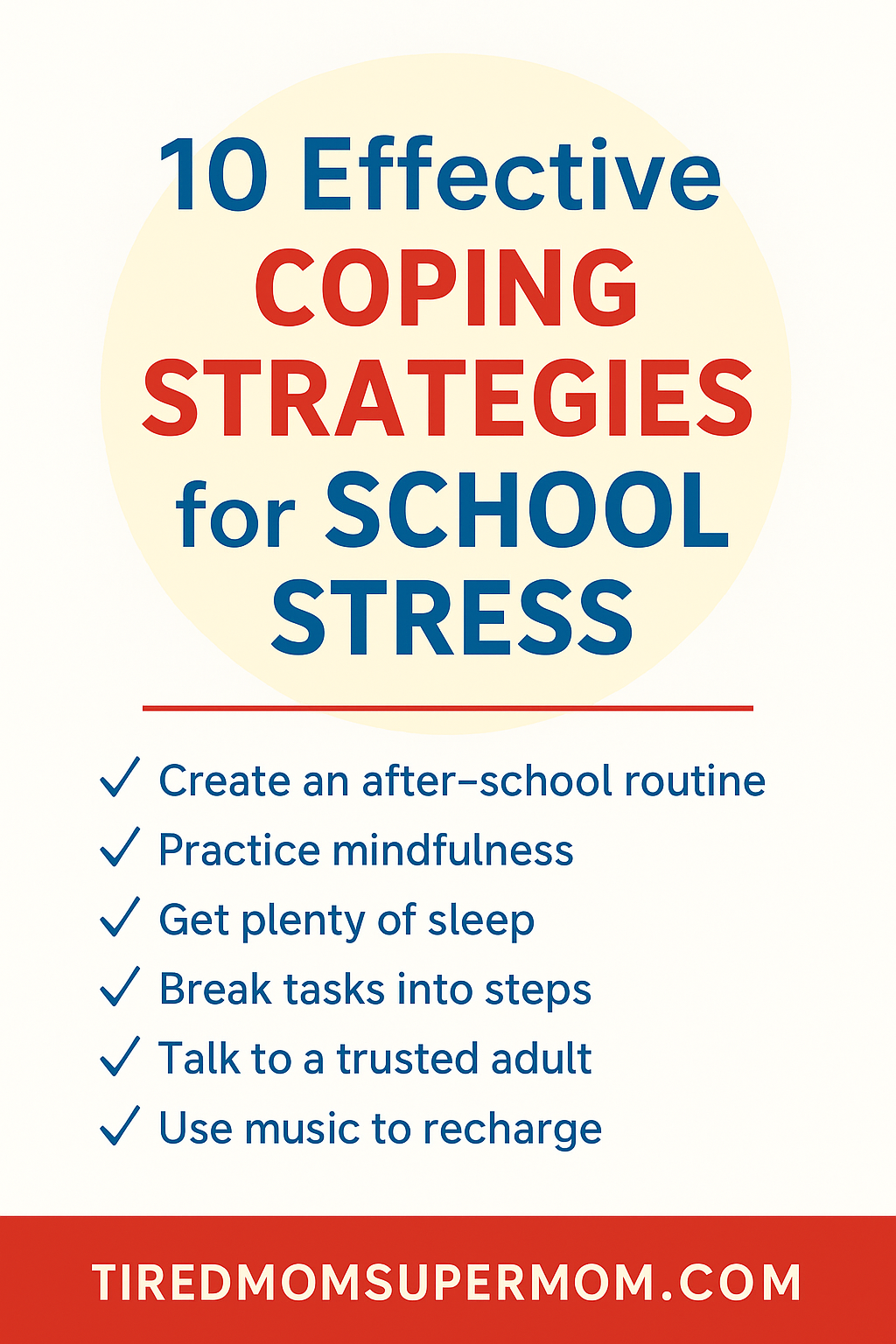10 Effective Coping Strategies for School Stress: A Practical Guide for Kids and Parents
Feeling overwhelmed by school demands? You’re not alone. School stress is a growing concern for children of all ages, and it’s showing up in everything from morning meltdowns to homework battles. Thankfully, with the right coping strategies for school stress, kids can feel more confident, calm, and in control.
Heads up: This post may include affiliate links. As an Amazon Associate, I earn from qualifying purchases—at no extra cost to you. Full privacy policy and disclosure here.
Why School Stress Is a Big Deal (and How to Spot It)
School stress isn’t just about tests and homework—it can stem from social pressures, time constraints, or even perfectionism. If your child seems more irritable, tired, or anxious than usual, they may be struggling with stress.
Early intervention makes a huge difference, and that’s where these coping strategies for school stress come in.
1. Establish a Relaxing After-School Routine
The hours after school are a golden opportunity to help kids decompress. Start with a snack, a short break, and a predictable sequence of activities like homework, play, and bedtime prep.
👉 Try this resource: 7 Simple Tips to Create an After-School Routine for Kids
🛒 Helpful tool: Kids’ routine chart – visual schedules reduce stress by providing structure.
2. Use Deep Breathing and Mindfulness
Breathing exercises help shift kids out of fight-or-flight mode. Teach them to inhale slowly for 4 counts, hold for 4, and exhale for 4.
🌱 Try simple guided meditations or mindfulness cards designed for children.
🛒 Mindfulness activity cards for kids – perfect for quick calming moments at home or school.
3. Encourage Plenty of Physical Activity
Movement is a natural stress reliever. Whether it’s sports, dancing, or backyard play, regular exercise improves mood and concentration.
🛒 Adjustable kids’ jump rope – portable, fun, and perfect for a quick stress-relief break.
4. Prioritize Sleep Hygiene
Stress skyrockets when kids don’t get enough sleep. Set a bedtime routine with limited screens, calming activities, and a consistent lights-out time.
👉 Try this related post: School Night Ritual That Helps Create Happy Kids
🛒 Children’s white noise machine – a soothing way to help kids wind down.
5. Break Big Tasks into Small Steps
Academic overwhelm often stems from not knowing where to start. Teach your child to break homework and studying into bite-sized goals.
👉 Related read: 10 Great Homework Tips for Parents
👉 Also check out: Effective Study Techniques for Different Learning Styles
🛒 Student planner for kids – builds time management skills and reduces panic.
6. Express Feelings Creatively
Art, journaling, music, and imaginative play are incredible outlets for emotional regulation. These help externalize stress without pressure.
🛒 Kids’ guided journal for emotions – gives your child a safe place to sort through school stress.
7. Build a Weekly School Schedule
A visual weekly calendar can help your child mentally prepare for what’s coming. Include assignments, events, and downtime.
🛒 Dry-erase weekly planner board – empowers kids with a sense of control.
8. Talk It Out With Someone Safe
Normalize talking about stress. Daily check-ins with a parent, teacher, or counselor can lighten emotional load and catch issues early.
👉 Need help starting the convo? 27 Engaging Questions to Ask Kids After School
9. Use Music or Quiet Time to Recharge
Some kids need a sensory break to reset. Offer headphones with calming playlists or quiet alone time after a busy day.
🛒 Kid-friendly noise-canceling headphones – great for downtime and focused homework sessions.
10. Connect With Supportive Friends or Mentors
School stress can feel isolating. Encourage your child to spend time with peers or mentors who make them feel safe, valued, and supported.
👉 Explore these options: Best Outschool Classes for Kids Online – great for finding interest-based social interaction.
BONUS: What to Do During a Homework Meltdown
If school stress explodes into tears or frustration, stay calm. Validate their feelings, offer a 10-minute break, and return with support.
👉 Read next: Homework Meltdown? 7 Easy Steps to a Stress-Free Homework Routine
🧠 The Psychology Behind Coping Strategies for School Stress
These strategies are grounded in cognitive behavioral therapy (CBT), which shows that structured routines, relaxation, and healthy communication can lower stress levels in children and teens.
For more insights, check out the American Psychological Association’s guide to childhood stress.
📌 Save & Share This!
Loved these tips? Pin this post for later and share with other parents navigating the school stress rollercoaster.
📌 Don’t forget to leave a comment below – which strategy helped your child most? 💬
❓ FAQ: Coping Strategies for School Stress
What is the best coping strategy for school stress?
The best coping strategy depends on your child, but daily routines, physical activity, and open communication consistently rank as top approaches. A mix of structure and flexibility works well.
How can I help my child who is anxious about school?
Validate their feelings, avoid minimizing the problem, and work together to implement supportive routines. Consider professional help if anxiety persists.
Are coping strategies different for younger vs. older kids?
Yes. Younger kids benefit more from visual tools and play-based strategies, while older kids might use journaling, goal-setting, and peer support.
Can mindfulness help school-related stress?
Absolutely. Mindfulness helps kids stay present, reduce anxiety, and regulate emotions. Even 2–5 minutes of practice a day makes a difference.
How do I know if school stress is becoming too much?
Watch for signs like sleep issues, irritability, stomach aches, or avoiding school. If symptoms are persistent or worsening, consult a pediatrician or counselor.
⭐ Final Thoughts
Helping kids build healthy coping strategies for school stress is one of the most powerful parenting tools you can offer.
With a few intentional changes, your child can transform stress into resilience.

